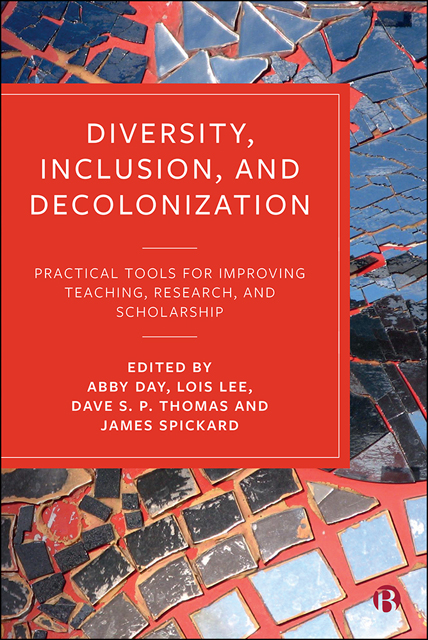 Diversity, Inclusion, and Decolonization
Diversity, Inclusion, and Decolonization Book contents
- Frontmatter
- Contents
- List of Figures and Tables
- Notes on Contributors
- Acknowledgements
- Typographical Note
- Introduction: Why Diversity, Inclusion, and Decolonization Matter
- Part I Changing Universities
- Part II Diversifying Curricula
- Part III Diversifying Research and Scholarship
- Part IV Overcoming Intellectual Colonialism
- Epilogue: What We Have Learned
- Index
Epilogue: What We Have Learned
Published online by Cambridge University Press: 13 October 2022
- Frontmatter
- Contents
- List of Figures and Tables
- Notes on Contributors
- Acknowledgements
- Typographical Note
- Introduction: Why Diversity, Inclusion, and Decolonization Matter
- Part I Changing Universities
- Part II Diversifying Curricula
- Part III Diversifying Research and Scholarship
- Part IV Overcoming Intellectual Colonialism
- Epilogue: What We Have Learned
- Index
Summary
We began this project about a year before the COVID-19 pandemic shut down the world. We sent the publisher our final manuscript just as the wealthy democracies began to reap the benefit of the vaccines that they had both developed and hoarded. Poorer countries need those vaccines but cannot get them. COVID-19 highlights the same lines of inequality that afflict higher education: elites benefit while others fall behind. Here are two other pandemic/education parallels:
• The virus hit working-class and minority communities harder than others because they lack equal access to advanced medicine and because their jobs do not typically give them the freedom of working safely from home. This parallels those communities’ lack of equal educational opportunities, including access to the libraries, the technological tools, and the time away from paid work that elite students take for granted. This structural discrimination is in addition to the personal prejudice along ethnic, gender, and other lines that has dogged higher education for decades.
• The virus spread along the same globally connected trade routes that once brought sugar, spices, and slaves to benefit European and American upper classes. Those routes have more recently brought refugees and voluntary migrants, who have increased Western democracies’ ethnic, religious, and cultural diversity without, however, having gained equal respect. We find it telling that one of the first vaccines for COVID-19 was developed by a pair of German scientists of Turkish descent, a group long excluded from German intellectual life (Sauerbrey, 2020). What other good ideas might be percolating among those whom our universities traditionally ignore?
Yet the COVID pandemic highlights more than our inequalities; it highlights a transformation in universities’ economic role. The fact that university-based research contributed so much to the anti-COVID fight tells us that higher education is no longer an ivory tower, nor (just) a repository of cultural tradition. It is a chief prop for the new ‘knowledge economy’.
Cutting-edge technology is no longer born in garages and tinkerers’ workshops; it emerges from university laboratories and from the tech giants’ research centres built nearby.
- Type
- Chapter
- Information
- Diversity, Inclusion, and DecolonizationPractical Tools for Improving Teaching, Research, and Scholarship, pp. 251 - 263Publisher: Bristol University PressPrint publication year: 2022


